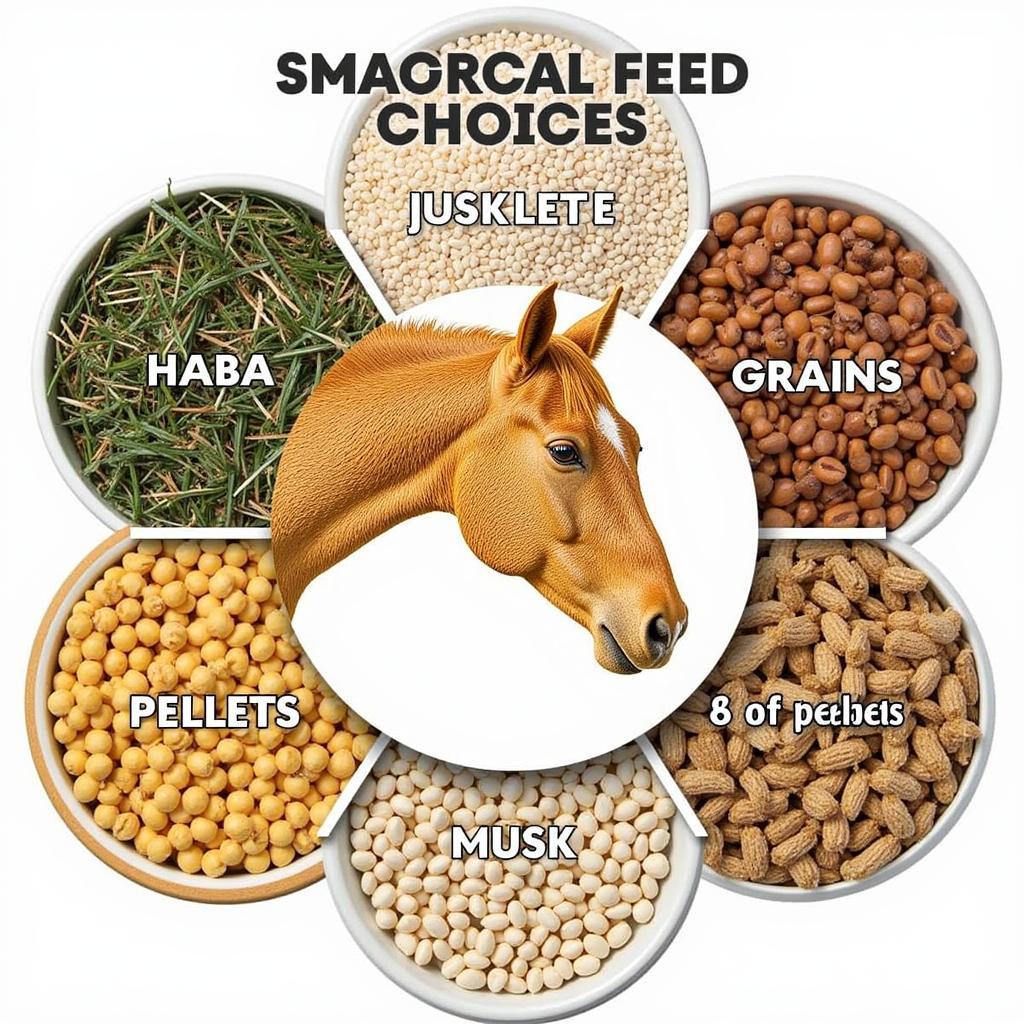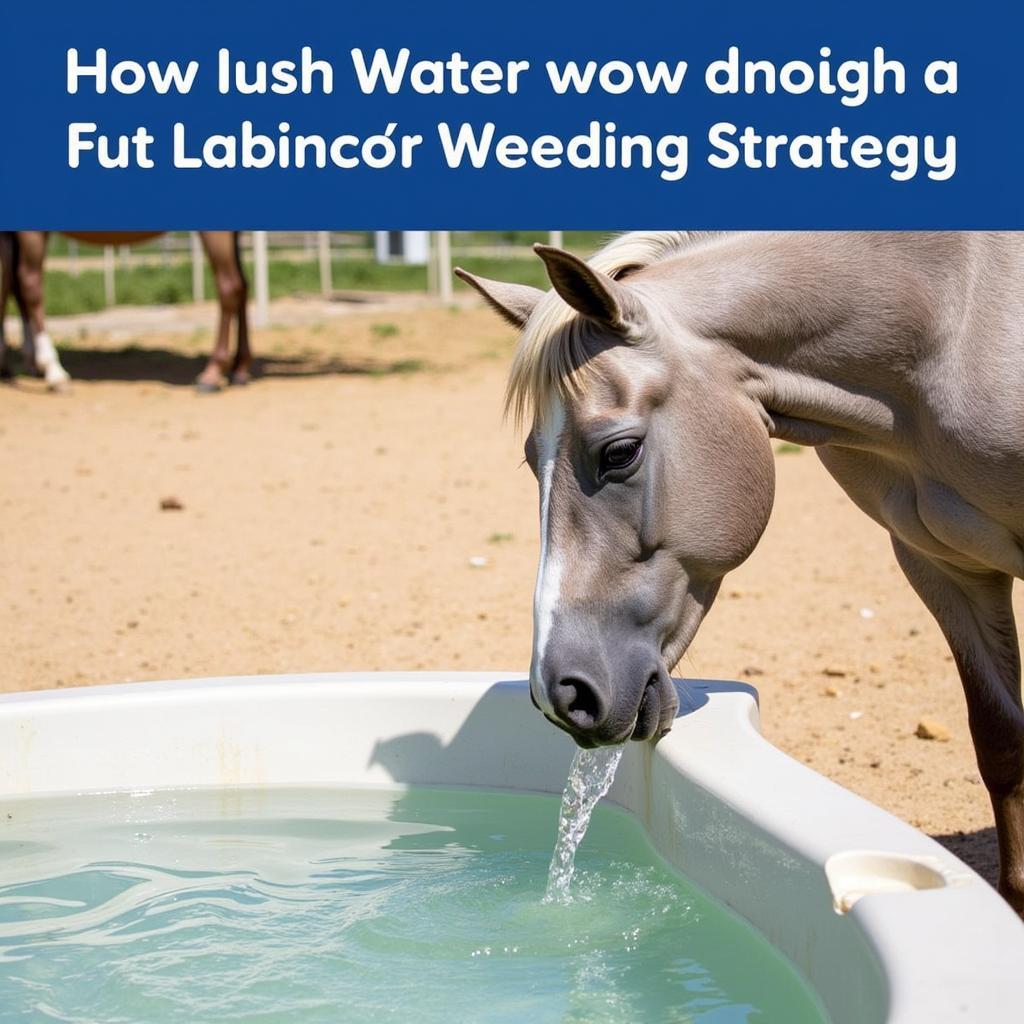A well-defined Horse Feed Strategy is crucial for maintaining your equine companion’s health, performance, and overall well-being. This comprehensive guide will delve into the essential elements of creating a tailored feeding plan, ensuring your horse receives the optimal nutrition it needs.
Understanding the Basics of a Horse Feed Strategy
Creating a successful horse feed strategy requires careful consideration of several factors, including your horse’s age, workload, breed, and overall health. A balanced diet should provide adequate energy, protein, vitamins, and minerals to support growth, maintenance, and performance. Forage, such as hay or pasture, forms the foundation of any equine diet and should always be the first consideration.
Remember that just like us, horses have individual needs. A young, growing horse will have different nutritional requirements than a senior horse with a lighter workload. Similarly, a performance horse will need a higher calorie intake compared to a recreational horse. Consult your veterinarian or an equine nutritionist to determine the best horse feed strategy for your specific situation. They can help you develop a customized plan that meets your horse’s individual needs. You might find helpful resources on strategy feeds horses.
Key Nutrients in Horse Feed
A comprehensive horse feed strategy involves understanding the key nutrients and their roles in equine health. These nutrients include:
- Protein: Essential for muscle development and repair.
- Carbohydrates: Provide energy for work and other bodily functions.
- Fats: A concentrated energy source, important for skin and coat health.
- Vitamins and Minerals: Play critical roles in various metabolic processes and overall health. Check the strategy horse feed label for details. Consider adding redmond salt for horses to your horse’s diet for essential minerals.
Why is Forage So Important?
Forage, including hay and pasture, provides the bulk of a horse’s diet and is essential for their digestive health. It supplies fiber, which keeps the digestive system functioning smoothly and helps prevent colic.
“Never underestimate the importance of high-quality forage,” advises Dr. Emily Carter, DVM, an equine veterinarian with over 20 years of experience. “It’s the cornerstone of any successful horse feed strategy.”
 Different Types of Horse Feed
Different Types of Horse Feed
Adjusting Your Horse Feed Strategy Seasonally
Your horse feed strategy should be adjusted seasonally to account for changes in temperature, workload, and forage availability. In winter, horses may require more calories to maintain body temperature, while in summer, they may need electrolyte supplementation to replace those lost through sweat. Make sure your horse barn fans are working correctly during the summer months to keep your horses cool.
How to Transition Feed Safely?
Any changes to your horse’s diet should be made gradually over 7-10 days to allow the digestive system to adapt. Abrupt changes can lead to digestive upset, including colic.
“Slow and steady wins the race when it comes to changing your horse’s feed,” says renowned equine nutritionist, Sarah Miller, PhD. “Gradual transitions are key to maintaining digestive health.”
 Horse Drinking Water From a Trough
Horse Drinking Water From a Trough
Conclusion
A well-planned horse feed strategy is crucial for optimal health and performance. By considering your horse’s individual needs and adjusting the diet seasonally, you can ensure they receive the nutrition they require to thrive. Remember to consult with your veterinarian or an equine nutritionist for personalized guidance and address any specific concerns. A sound horse feed strategy involves understanding the key nutrients, prioritizing forage, and adapting to seasonal changes. Also, ensure you are providing adequate vitamin e for horses with epm if needed.
FAQ
- How often should I feed my horse?
- What type of hay is best for my horse?
- How much grain should I feed my horse?
- What are the signs of a nutritional deficiency in horses?
- How can I ensure my horse is getting enough water?
- What are the best horse feed strategies for senior horses?
- How do I adjust my horse’s feed for increased workload?
Common Scenarios and Questions
-
Scenario: My horse is losing weight.
- Questions: Is my horse getting enough forage? Is the quality of the hay good? Could there be an underlying medical condition?
-
Scenario: My horse is overweight.
- Questions: Am I overfeeding my horse? Is my horse getting enough exercise? What type of feed should I be using?
-
Scenario: My horse is prone to colic.
- Questions: Is my horse’s diet high in fiber? Am I making feed changes gradually? Is my horse getting enough water?
Further Reading and Related Articles
- Check out our article on feeding senior horses.
- Learn more about the different types of horse feed.
- Find out how to manage your horse’s weight effectively.
Need help with your horse feed strategy? Contact us! Phone: 0772127271, Email: [email protected] or visit us at QGM2+WX2, Vị Trung, Vị Thuỷ, Hậu Giang, Việt Nam. We have a 24/7 customer support team.